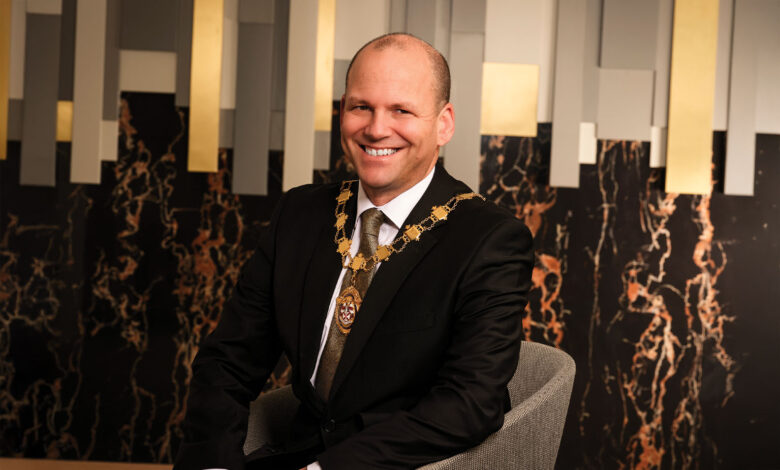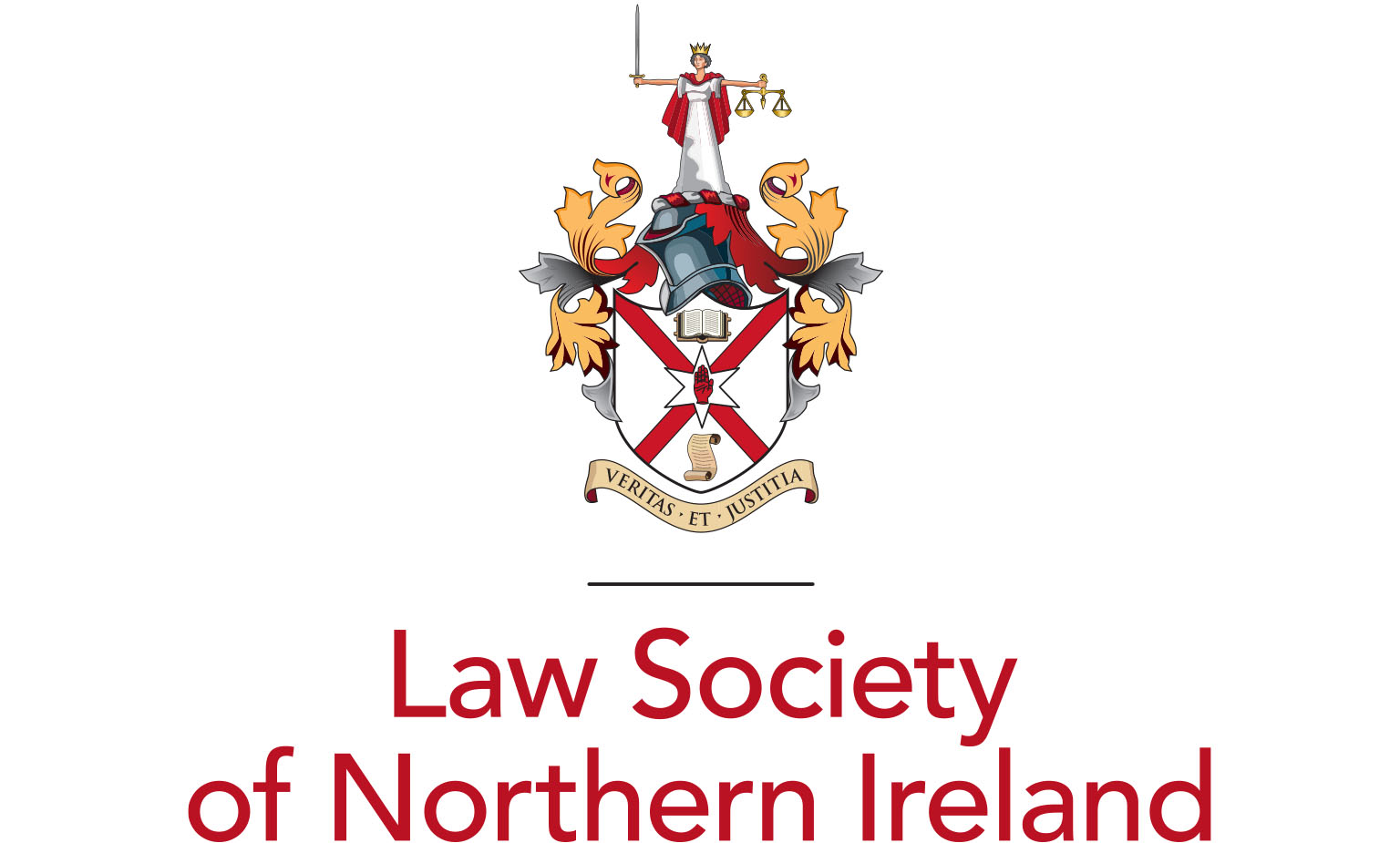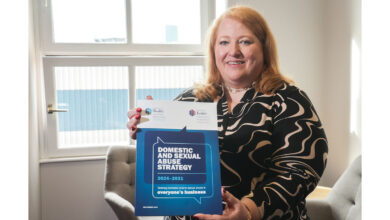Leading the profession into the future

As he steps into the role of President of the Law Society of Northern Ireland, Colin Mitchell brings a wealth of experience and a clear vision for the profession.
A senior partner at McCartan Turkington Breen with a self-confessed propensity for directness and a no-nonsense approach, Mitchell is widely recognised for his ability to tackle challenges head-on and deliver results.
Despite his straightforward nature, he is an advocate for progress and inclusivity, and is passionate about upholding a strong sense of collegiality within the solicitor profession.
Throughout his presidential year, Mitchell aims to address the challenges solicitors face while at the same time steering the profession toward a more dynamic, responsive, and forward-thinking future. In this exclusive interview, he discusses his aspirations, the pressing issues at hand, and the values that underpin his leadership.
Q: Congratulations on your appointment. What inspired you to pursue the presidency of the Law Society?
A: Thank you. It is a real privilege to serve as President. My journey within the legal profession has always been about making a difference. Over the years, I have gained an understanding of the challenges and opportunities facing solicitors. The chance to advocate for our members and contribute to shaping the future of the profession is what inspired me to take on this role. I firmly believe that change is important, yet it is only possible if you place yourself in the middle of things rather than criticise from the sidelines. That is why I stood in the election for Law Society Council and soon after the opportunity to become President arose.
Q: What are your key priorities for your term as President?
A: My primary objective is to ensure that the Law Society remains a strong, relevant, and supportive organisation for our members. The legal profession is undergoing profound changes, and I want to ensure our solicitors are equipped to adapt and thrive. Promoting inclusivity and diversity within the profession is another central goal – I believe a legal profession that reflects our society is essential to building trust with the communities we serve. For this reason, I have selected the NOW group as my charity of the year, they do fantastic work levelling the playing field and ensuring workplaces are open and inclusive.
Q: The legal profession is no stranger to challenges. What do you see as the most significant issues facing solicitors today?
A: One of the biggest challenges is keeping pace with change — be it in technology, or client expectations. Many solicitors are dealing with increasing complexity in their work while managing economic pressures. Cybersecurity is an ever-present concern as we rely more on digital platforms. I am particularly concerned that the vital role solicitors play ensuring access to justice is not recognized. The system relies on lawyers who are willing to work in the criminal courts and who are prepared to turn up at police stations in the middle of the night to represent people in police custody. Likewise, within the civil sphere, the system would collapse without solicitors who work beyond the call of duty to ensure their clients needs are met. It is unacceptable that solicitors are consistently dealing with the traumatic life events of their civil legal aid clients without adequate renumeration.
Without lawyers who are willing to provide these services the justice system will grind to a halt. No one should be expected to work for fees which are at least 20 years out of date. We have now reached crisis point. An immediate injection of funding into the system, including legal aid is the only hope of preventing the collapse. Ensuring that access to justice is preserved and that our members receive fair compensation will be a key focus for me throughout my presidential year.
Q: On the topic of technology, how can the Law Society assist solicitors in embracing innovation while mitigating risks?
A: Technology offers transformative potential for the legal profession, but it must be adopted thoughtfully. The Society plans to provide training and resources to help solicitors understand and implement tools that enhance efficiency without compromising ethics or client care. For instance, legal tech can streamline processes and improve access to justice, but we must also address concerns such as data protection and equitable access. We are also working to create forums where solicitors can share experiences and best practices related to technology use.
Q: Diversity and inclusion have become pressing topics in many industries. What specific steps will you take to promote these values within the profession?
A: The legal profession is at its best when it reflects the diverse society it serves. Achieving this requires proactive efforts, and the Law Society is committed to playing a leading role. We are developing programmes to encourage people from underrepresented backgrounds to consider careers in law, including outreach to schools and community organisations. For example, every year we employ two interns providing them with paid work experience in the policy and engagement sphere. We also offer a Centenary Bursary for students from socio-economically deprived backgrounds who wish to qualify as solicitors yet could not afford the tuition fees.
Just this year our education committee launched a major consultation on entry routes into the profession with the aim of ensuring the profession is as open an inclusive as possible. As part of our equality, diversity, and inclusion commitment we are also looking at policies, including flexible work arrangements, a women’s network, and ongoing mentorship initiatives, to ensure that barriers to participation are removed.
Q: What are your thoughts on the increasing emphasis on work-life balance within the profession?
A: Work-life balance is vital, not just for individual wellbeing but for sustaining a healthy profession overall. The demands of legal work can be intense, and without balance, there is a risk of burnout. For me, it is about being organised and disciplined with my time. Juggling the demands of practice, presidency and family life is a challenge yet I have an excellent support team both in the Society and at my firm, and I am disciplined with giving enough time for effective planning to take place to ensure I get the balance right.

However, I know our smaller firms do not have that luxury and often rely on a few key people to keep their business afloat. For me the Society has a key role to play in supporting these individuals. We have a range of initiatives that raise awareness and provide practical tools for practitioners. For instance, we have launched a ‘wellbeing toolkit’ and offer access to therapeutic support through Law Care, a charity which promotes and supports better mental health across the legal sector. Encouraging firms to adopt policies that prioritise flexibility and wellbeing will benefit both solicitors and their clients therefore this will also be a key focus of my presidential year.
Q: What is your vision for the future of the solicitor profession in Northern Ireland?
A: I envision a profession that is resilient, inclusive, and future-ready. Solicitors must remain central to promoting justice and upholding the rule of law, even as the environment in which we operate changes. We need to position ourselves as problem-solvers, ready to embrace new ways of working while maintaining the profession’s core values. By building a culture of collaboration, adaptability, and lifelong learning, I believe the legal profession will continue to thrive.
Q: How does the Law Society intend to bridge the gap between solicitors and the communities they serve?
A: Trust and accessibility are at the heart of bridging this gap. Solicitors are central support functions in all communities across Northern Ireland. They are already doing exceptional work in advocating for individuals and businesses but there is always more we can do to communicate that value. I find the solicitor profession to be quite modest and often prone to underselling the important work they do.
Q: What message would you like to share with your fellow solicitors as you begin your presidency?
A: First and foremost, I want to thank my colleagues for the trust they have placed in me. My role as President is to listen, represent, and support all of you as we face challenges and opportunities together. I encourage open dialogue, and I urge you to reach out with your ideas, concerns, and suggestions. By working collectively, we can overcome the hurdles ahead and ensure that the solicitor profession continues to lead with integrity, adaptability, and excellence. I know many smaller firms are struggling with economic challenges, insufficient legal aid funding and an ever-changing complex landscape. However, never underestimate the value of your colleagues and always reach out for support when you are in need. My core message is, we are all in this together so let’s help one another for the future of the profession and the communities we serve.
| As Colin Mitchell begins his term, his leadership is marked by a keen understanding of the profession’s complexities and a passion for progress. His tenure promises to bring a collective focus on addressing the needs of both solicitors and the clients they serve. With challenges ahead, the Law Society of Northern Ireland has found a leader ready to turn adversity into opportunity. |

E: enquiry@lawsoc-ni.org
W: www.lawsoc-ni.org





